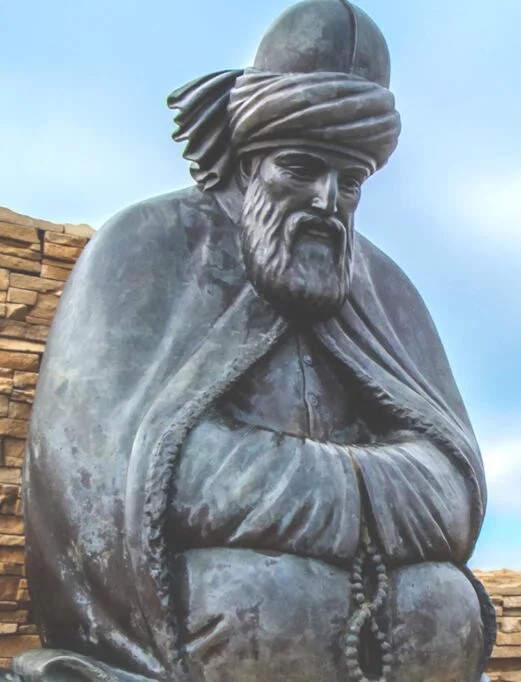
Jalal ad-Din Muhammad ar-Rumi also Called Jalal ad-Din Muhammad Balkhi, the emminent one in Sufism and a well-known Persian poet in the 13th century.
He was occupied with the thoughts and ideas of Sufism which influenced the mystical thoughts of the Muslim world.
Jalal ad-Din Muhammad ar-Rumi or simply ‘Rumi’ is dedicated to delivering great mystic poems in the Persian language.
He is famous for his “ Spiritual Couplets” ( Masnavi- yi Ma’ navi ). His teachings influenced the whole Muslim world in a great way, he inspired with his words and also influenced Persian Literature a lot.
Jalal ad-Din Muhammad ar-Rumi was not only a Persian poet but was a Jurist, Islamic scholar, theologian, and Sufi mystic who lived his life in Konya, a city ruled by the Ottoman Empire.
Rumi turned out to be the most satisfied and best-selling poet all over the United States. Rumi’s poems have been translated into many different languages, thus he became a complete preference and influencer all over the world.
Rumi’s Early life and background
Jalal ad-Din Rumi was born in 1207 in Balkh (present Afghanistan) thus he was called Jalal ad-Din Muhammad Balkhi. He completely belonged to a family who had deep spiritual and Scholarly roots. His father Bahauddin Valad, the true inspiration of Rumi was a renowned scholar and a mystic. His teachings directly hit and influenced Rumi’s life from the beginning. Bahauddin Valad was a great leader in Balkh, as he gathered great respect and followers for his ideas. This shaped a complete foundation for Rumi’s intellectual and spiritual uprising.
Being a child itself Rumi was immersed in the world of devotion. His Father Bahauddin Valad was the first teacher who taught him the principles of Islamic theology, jurisprudence, and also about Sufism. Creating a wide path to his ideals and thoughts Rumi followed his love for knowledge and spirituality. Both religious and mystical thoughts started to cultivate in Rumi’s mind. At the time everything was going perfectly, there came the Mongol invasion of the Early 13th century which purposefully forced Rumi’s family to leave Balkh. They went through many cities as a part of their migration which includes Nishapur, Baghdad, and Mecca. At last, they settled down Their lives at Konya( the present Turkey). Rumi got always excited about traveling and learning new things, thus throughout the journey Rumi continued his studies, engaged himself in earning rich intellectual and spiritual experiences, and also the quest for divine love emerged along the way. This also helps in enlarging the Beauty of Rumi’s works later.
Encounter with Shams of Tabriz
Shams of Tabriz or shams-e-Tabrizi a spiritual instructor and a Persian mystic poet who played a transformative role in Jalal ad-Din Muhammad ar-Rumi’s life. He was a wandering dervish who deeply embodied a severe approach to divine love and spiritual Enlightenment. Shams conveyed the true essence of love, not just as a Human but as a divine thing that holds the mystical world.
Their bonding was beyond anything, Shams was not only a good mentor for Rumi but also acted as a mirror of Rumi’s soul. Sham’s teachings and dedicated insights created strength for Rumi and gave him the power to question the formal religious beliefs that he had followed. The influence of Shams impacted in shifting Rumi’s thoughts to go for the mystical pursuit of divine love. This is reflected in every Rumi’s poetry later.
The encounter in between Shams and Rumi marked a pivotal space in Rumi’s history. This deep bonding makes a great impact on the world and also makes Rumi’s followers jealous. The sudden missing of Shams makes Rumi a sorrowful situation, yet he overcomes it by creating a space for Shams in his poetry. Particularly in “divan-e Shams-e Tabrizi and Masnavi”, Shams became the symbolic presence of Divine love and their bonding remained to the symbol of Truth.
“ I am neither of the East nor the West, no boundaries exist within my breast.”
Jalal ad-Din Muhammad ar-Rumi ( Divan-e Shams-e Tabrizi)
Rumi: Literary Contributions
Rumi creates a healthy and prosperous contribution to the world of literature. His poems travel beyond the boundaries of culture, religion and time. The two important works among them are “Divan-e Shams-e Tabrizi” and “ Masnavi”.
- Divan-e Shams-e Tabrizi: This is a depiction of dedication to his mentor Shams. On the other hand, it is a Collection of poetry and a spiritual guide, which expresses the involvement of Shams in Rumi’s life. The poems teach about Divine love and the Divine presence of Shams’s influence and the symbolism. The Divan is created as a character who is passionate and unorthodox over the taboo of formal religious forms and breaks it away to express the nature of spiritual love. This resembles the teachings of Shams taught to Rumi.
- Masnavi: Referred to as the ‘ Quran of Persian’ is a spiritual epic containing six books. The book tells us the intricacies of a soul’s journey towards God. The Masnavi is filled with parables, Stories and teachings. This is a complete profound of Sufism and also contains the theme of divine love, unity, and outbreaking one’s ego and entering the truth of Divinity.
Every influence of Rumi’s poetry is easily visible over the period. Rumi’s works affected the works of later poets.
Rumi’s always kept his Legacy of indifference to time, place and culture. Both Eastern and Western thoughts were influenced by spirituality, philosophy and literature.
The ideal theme of love, unity and divinity is continuing its Legacy which offers timeless wisdom even in the modern world.
Rumi’s works are Celebrated globally in respective of cultures it remains relevant today because of the spiritual integrity of the Divine love.
Books